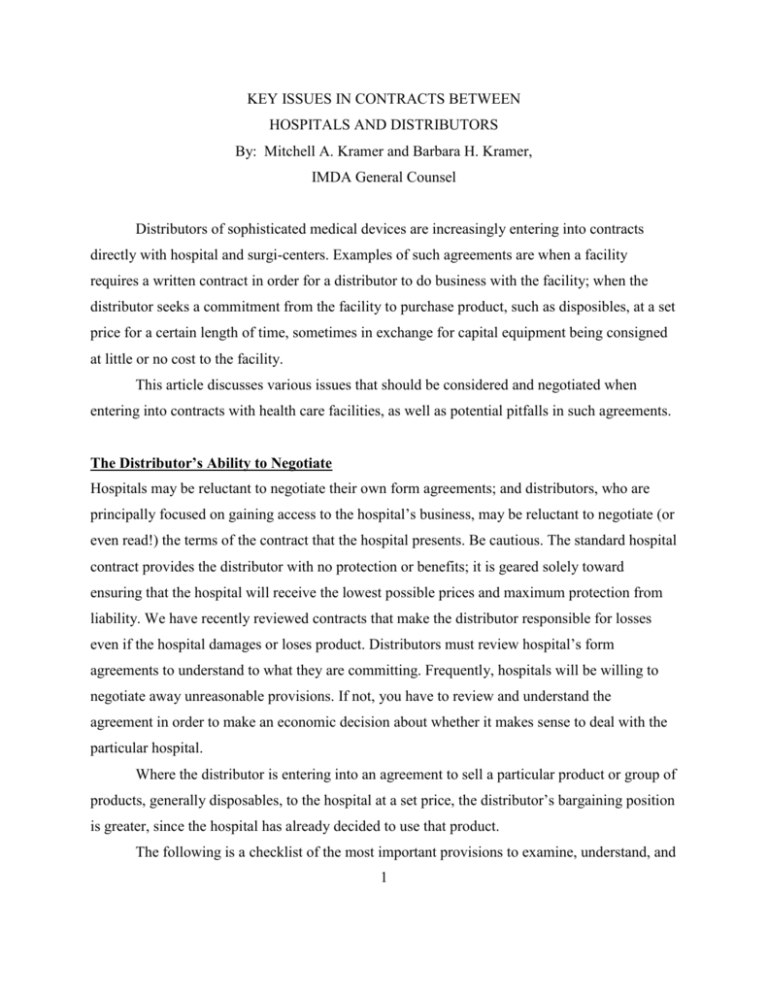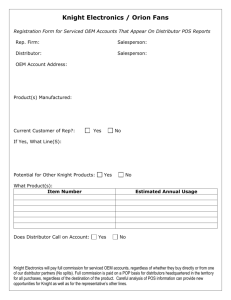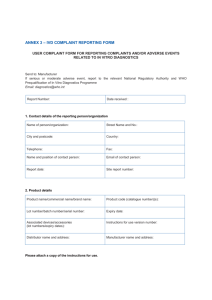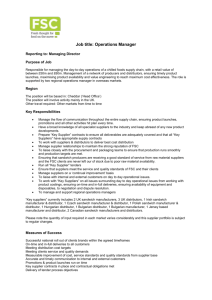KEY ISSUES IN CONTRACTS BETWEEN
advertisement

KEY ISSUES IN CONTRACTS BETWEEN HOSPITALS AND DISTRIBUTORS By: Mitchell A. Kramer and Barbara H. Kramer, IMDA General Counsel Distributors of sophisticated medical devices are increasingly entering into contracts directly with hospital and surgi-centers. Examples of such agreements are when a facility requires a written contract in order for a distributor to do business with the facility; when the distributor seeks a commitment from the facility to purchase product, such as disposibles, at a set price for a certain length of time, sometimes in exchange for capital equipment being consigned at little or no cost to the facility. This article discusses various issues that should be considered and negotiated when entering into contracts with health care facilities, as well as potential pitfalls in such agreements. The Distributor’s Ability to Negotiate Hospitals may be reluctant to negotiate their own form agreements; and distributors, who are principally focused on gaining access to the hospital’s business, may be reluctant to negotiate (or even read!) the terms of the contract that the hospital presents. Be cautious. The standard hospital contract provides the distributor with no protection or benefits; it is geared solely toward ensuring that the hospital will receive the lowest possible prices and maximum protection from liability. We have recently reviewed contracts that make the distributor responsible for losses even if the hospital damages or loses product. Distributors must review hospital’s form agreements to understand to what they are committing. Frequently, hospitals will be willing to negotiate away unreasonable provisions. If not, you have to review and understand the agreement in order to make an economic decision about whether it makes sense to deal with the particular hospital. Where the distributor is entering into an agreement to sell a particular product or group of products, generally disposables, to the hospital at a set price, the distributor’s bargaining position is greater, since the hospital has already decided to use that product. The following is a checklist of the most important provisions to examine, understand, and 1 consider negotiating when entering into a contract with a hospital or other healthcare provider. Description of Product and Price. What are you selling or being allowed to sell, and at what price? In any contract between the distributor and the hospital, the products being sold and the pricing should be described in detail. You should consider whether you want to include in the description of the products the phrase “including modifications and upgrades of the products.” Be sure that you understand how and under what circumstance the price can be changed, either by you or by the hospital. For example, if your costs change or if the products are modified, does that allow the price to be changed? Are there caps (such as a maximum dollar or percentage increase) on price increases? Before executing any hospital contract, you should examine your relationship and contract with product manufacturers to determine whether the manufacturer can increase the cost to you during the period that the hospital contract will be in effect. If so, you will want to consider getting a commitment from the manufacturer that prices will be maintained for the life of the hospital contract. Similarly, if your contract with the hospital requires you to sell a given number of disposables at a certain price, you should have, in writing, a commitment from your manufacturer that the product will be available. In these situations, you might want to consider having manufacturers agree to, and even be signatories to, your hospital contracts. You must also evaluate the circumstances that would allow the hospital to insist that the price of product be decreased. Is there a “most favored nations clause” -- a provision that says that if you sell the same product to another customer at a lower price, you must offer the product to this hospital at that lower price? Backorders and Product Availability. What happens if your manufacturer is backordered on the product you are to provide the hospital, or ceases manufacturing the product for some reason? Does the contract have any provisions that would protect you in that situation? What liability do you have, if any, to the hospital if you simply cannot provide the product that you have contracted to provide? 2 Payment Terms and Effect of Reimbursement. What is the hospital’s obligation if its reimbursement by third-party providers for the product you are selling changes? Is product price somehow tied to reimbursement? Related, is your payment tied to the timing of the hospital’s reimbursement? You should ensure that you understand the timing of payment and negotiate appropriate terms. Does the contract provide that you are paid within a certain amount of time after the product is delivered, after you invoice for the product, or when the hospital is paid for the product? Beware the pitfall of contracts that leave you vulnerable to non-payment if the third-party payer does not pay for the product. In addition, the contract should provide for interest at a set rate for late payments. Whether you enforce such interest payment is ultimately your choice. Minimum Quantity. Is the hospital required to purchase a minimum quantity of the products that you are selling per year, per month, or on some other basis? Product requirements may be particularly important if you are required to consign large quantities of product to the hospital, or if you are providing capital equipment to the hospital, i.e., for use with purchased disposables. What happens if the hospital fails to purchase the minimum quantity of products that it is to buy? Must it buy product to make up the difference, pay some amount of money to compensate you for the shortfall, or is the only remedy your right to terminate the contract? Exclusivity. If you are entering into a contract to be allowed to sell into the hospital, does the hospital have any obligation to purchase product from you and, if so, what is that obligation? Is your contract with the hospital exclusive or does it allow the hospital to purchase product from other sources? Distributors sometimes think that they have an exclusive relationship but find that the contract does not provide for exclusivity. Length of Contract. What is the contract term? Does it automatically renew or does it expire after a certain time, requiring that that contract be re-negotiated and re-executed? What happens to the price if the contract is renewed? Watch out for contracts that say that they are for a term of a year or years, but include a provision that says that the hospital may terminate the contract with 3 or without cause with a specified amount of notice, frequently 30 days. Such a clause makes the terms of the contract effectively meaningless, since the hospital can terminate at will. If the contract contains a provision requiring you to give notice if you wish to renew (or to terminate), be certain that you understand those requirements and have properly calendared them so deadlines are not missed. Indemnification. One of the major issues in any contract between a hospital and a distributor is who bears financial responsibilitye in the event of a third-party claim for negligence or product liability. Naturally, there should be insurance. But the agreement must spell out who has to carry insurance, how much insurance must be carried, and whether a party is required to make the other an additional insured on applicable policies. The contract requirements about insurance should be scrupulously examined and understood to ensure compliance. Unlike commissioned sales agents, who do not take title to product, distributors are likely to be sued in the event of a product failure, yet most distributors do not carry product liability insurance, and the cost of such insurance may be prohibitive. Again, your relationship with the product manufacturer is critical. Your contract with your manufacturer must provide that the manufacturer will indemnify you and pay your counsel fees in the event of litigation, and the contract should expressly require that the manufacturer maintain appropriate insurance. It should be recognized that insurance may not be enough in the event of a really serious injury. There are also times when, for example, there is a claim of an intentional injury. Insurance may not cover such a claim. One of the things that you must be careful about is whether you, as owner of the distribution company, are personally responsible for carrying out the contract and, therefore, could be personally liable for injuries resulting from the sale of the products. It is critical that you establish appropriate corporate entities to limit your personal exposure and are aware of when a contract might expose you to personal liability. Notably, even if a distributor is added as an additional insured on a manufacturer’s liability policy, the policy will probably not protect the distributor if it is the distributor’s negligence that causes an injury. Also, there is no guarantee 4 that a manufacturer will have such insurance in effect at the time of an accident. Product Delivery and Consignment. Does the agreement provide for just-in-time delivery or is product consigned to the hospital? If product is consigned, there should be a provision as to where the risk of loss or damage falls. Once the product is consigned to the hospital, it should be the hospital’s responsibility until it is returned in its original package undamaged. There should also be a provision as to the circumstances under which the hospital can return consigned inventory, and under what circumstances you can insist on the return of such inventory. In the event that substantial amounts of inventory are being consigned to a hospital, you may want to enter into a separate consignment agreement, or ensure that all of the relevant provisions concerning risk of loss of consigned product are addressed. Capital Equipment and Disposables. In the situation where the distributor is providing a piece of capital equipment and selling disposables, the contract should provide for the terms under which the equipment is being provided -- i.e., is it being sold, leased, or simply placed in the hospital? If it is placed in the hospital, but not being sold to the hospital, is there some time or certain circumstances under which the hospital acquires or can acquire title to the device? If the device is still owned by the distributor, under what circumstance can the distributor take back the device? Certainly, if the hospital defaults on its obligations under the agreement to purchase disposables, the distributor should have the right to repossess the device. The contract should also specify the hospital’s obligation to insure and maintain equipment, and ensure that proper training is provided. Additional issues that may be addressed in the contract are, what training is given on the equipment, who is responsible for the cost of repairs, and who pays the freight, taxes, and set-up costs to place equipment in the hospital. If you are responsible for training or maintenance and you expect to be compensated for these services, that must be addressed in the contract where the disposables are being used for a piece of equipment owned by the hospital or another provider. Rights of Assignment. Can the distributor’s rights under the contract with the hospital be 5 assigned to another distributor or to a manufacturer at the distributor’s request? If the hospital is sold or merged into another entity, what effect does that have on your rights? Recalls. Any contract with the hospital should make a provision for the possibility of recalls and outline a procedure to be followed by both parties in the event of a recall. Does the distributor face any possible liability because of the recall, or is liability limited to third-party claims of a defective product? You might consider requesting a provision specifying that your liability, in the event of a recall, is limited to the cost of the recalled product. Confidentiality. You may wish to require a contract provision that the terms and conditions of the agreement, including price, are to be confidential. Product Warranties. Hospitals will often want you to warrant the condition of the products that you are selling to the hospital. You must be careful to not warrant more than your manufacturer has warranted to you. Consider communicating with the manufacturers concerning the scope of warranties and to ensure that you are adequately insured. Litigation, Choice of Law, and Venue. The contract will probably state what state’s laws applies to any disputes between the parties and provide where any litigation is to be held. It may also provide that any dispute must be resolved in arbitration (rather than a court). You will want to consult a lawyer to determine the meaning and effect of these provisions. Some contracts say that only breaches of the contract are to be arbitrated, leaving open other issues to be decided in court. Other contracts say that all disputes between the parties will be decided by arbitration. This could create a problem if an injured third party sues both the hospital and the distributor. Another provision that is often written into these types of contracts is that the prevailing party is entitled to counsel fees and costs from the other party. Though this may sound appealing if you are forced to sue for monies owed, these provisions increase the risk of litigation since a loss leaves you responsible not only for your own counsel fees, but those of the other side. Addendums and Attachments. Many contracts offered to distributors by a hospital contain 6 addendums and attachments. There is a temptation to read the contract itself carefully, but to ignore the addendum, addendums or the attachment. Often, these added provisions are as important or more important than the contract itself. They should be read just as carefully, since they may contain provisions that do not appear in the body of the contract or significantly change the meaning of the contract itself. Product Defects. There should be a provision in the contract providing that the hospital has a specified limited amount of time to report defects in products shipped to it. Otherwise, it is barred from raising such issues. Compliance with Law and Regulations. Any contract between a distributor and a hospital should provide that all parties must abide by all laws and regulations governing the sale and utilization of the product. There probably should be a listing of at least the important laws that must be followed. Many of them are listed in the IMDA form distributor selling agreement. Key laws are the Stark Act and the anti-kickback provisions of the Social Security Act. AdvaMed Code. Many agreements in the medical device industry, including those between distributors and hospitals, refer to the AdvaMed Code of Conduct and require that that code be followed. The distributor should be familiar with the AdvaMed Code. The IMDA Code of Conduct parallels the AdvaMed Code in many respects, but is more pegged to the ethical requirements of a distributor, whereas the AdvaMed Code is more attuned to the ethical obligations of a manufacturer. If the contract refers to the AdvaMed Code, the contract should be required to have a copy of that code attached as an exhibit. It should be noted that the AdvaMed Code is sometimes modified, so that a contract should require the distributor and the hospital to abide by that draft of the code that is attached to the contract. Non-Contractual Protection. When entering into contracts with healthcare providers, be very careful the contract contains the correct names of all of the parties to the contract. As referenced above, understand whether you are being asked to provide a personal guarantee. If only your corporation is signing the contracts, and you have followed all requirements for maintaining a 7 corporation in good standing (such as conducting annual meetings of shareholders and directors, keeping current on required filings, and paying all corporate taxes and franchise fees), you can usually protect your personal assets in the event of a lawsuit. No distributor of sophisticated medical devices should operate its business as a sole proprietorship; the business should be structured as a corporation (a C, sub-S, or limited liability corporation) or as some other entity allowed by your state that insulates you from personal liability. Obligations of Hospital. Particularly in contracts presented to you by healthcare providers, there are generally few obligations imposed on the entity that drafted the contract. You should carefully consider what you need or want the hospital to do, and if it is not already in the contract -- which it probably is not -- you should negotiate to have it included. For example, the hospital will undoubtedly have a provision requiring you to abide by all laws and regulations. You should insist that the same obligations be placed on the hospital. While everyone must abide by the law, failure to do so is not a breach of contract unless the contract itself requires it. You may want the hospital to have a limited amount of time to reject product. That should be in the contract. The institution should be obligated to return consigned inventory upon your request and should be responsible for lost or damaged product. If you have to service, repair, install, or provide training on products, there should be a provision that the hospital will afford you reasonable cooperation and assistance, and compensation if appropriate. Penalties for Default. One of the things to look for in any contract is what happens in the event of a default. The most usual provision states that the contract can be terminated by the nondefaulting party if a party defaults. Some contracts provide for liquidated damages (that is, a definite dollar amount or formula amount to be paid if there is a breach). You should be aware of the consequences of breach specified in the contract. In contracts with hospitals, you should be particularly alert to a provision that provides that in the event a distributor breaches, it can be debarred from the hospital. While it is bad enough to be unable to sell to one of your potential customers, the consequences of debarment may be much greater. Many contracts between distributors of sophisticated medical devices and the manufacturers of the medical devices provide that the contract may be terminated if the distributor is debarred. 8 Boiler Plate. The words “boiler plate” or “standard language” are thought by many non-lawyers to mean provisions in contracts that are always used and therefore unimportant. That is a false assumption. Particularly in contracts between distributors and hospitals, many of which have been written for the first time only recently, every provision has to be carefully examined. The language of these types of contracts can greatly affect your bottom line. Your risk of being enmeshed in a long, time-consuming, extremely expensive liability case may depend on the language of the contract. Depending on the language of these contracts, you may be putting yourself at risk without even receiving any assurance of your receiving sales orders. If you have made a business decision that you should enter into an agreement with a particular hospital, and your bargaining provision is relatively weak, at least know and understand the risks that you are assuming. To the extent that you can ensure against those risks, either through insurance or through careful note taking and recordkeeping in your business, make sure that you protect yourself as well as you can. Contracts between distributors of medical devices and hospitals are increasingly common. The constantly changing nature of the business and the changes in the law and regulations mean that such contracts will become more prevalent. Whether you are providing product under a long-term, fixed-price contract, or the hospital is requiring you to sign an agreement as a condition of your selling any products, there will be more such contracts for you to consider. Before you throw up your hands and assume that you must sign whatever is offered, make sure that you understand the most important provisions of the agreement and the impact they could have on your business; consider the possibility that many of those provisions can be negotiated; and let the signer beware! 9






